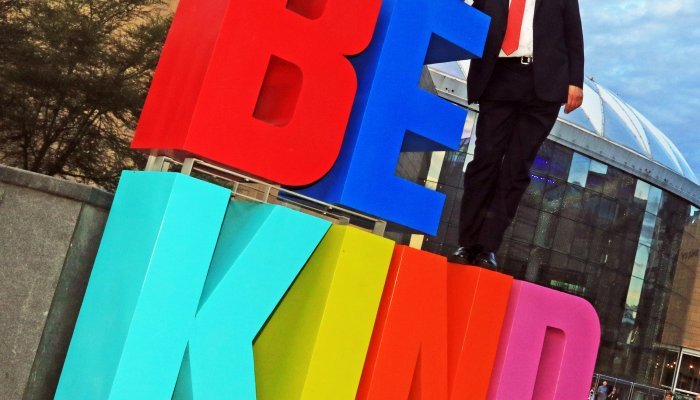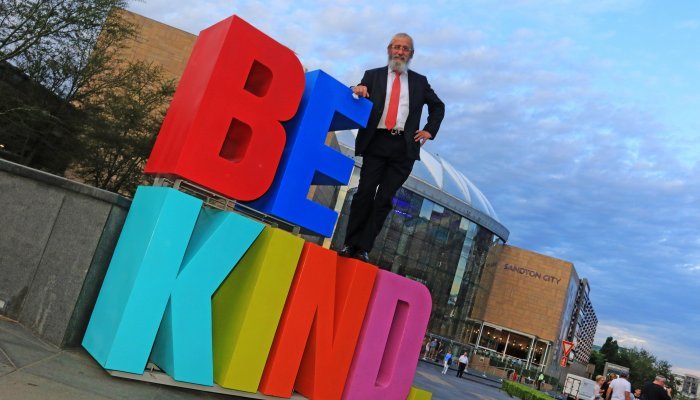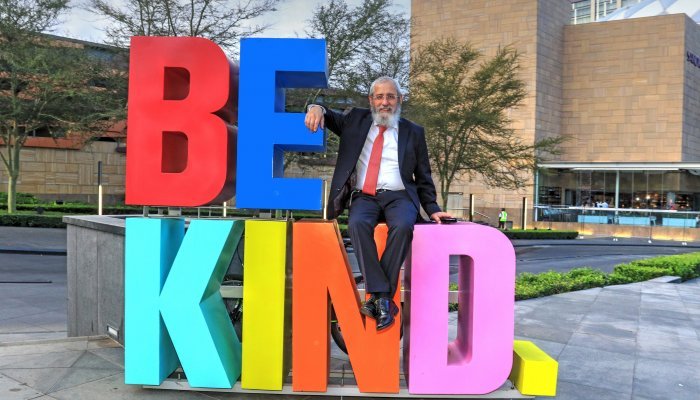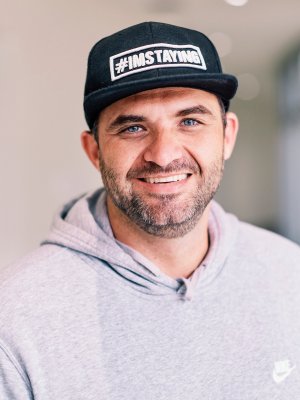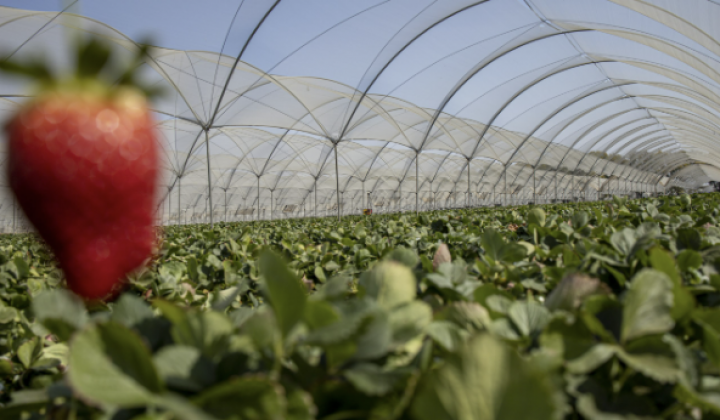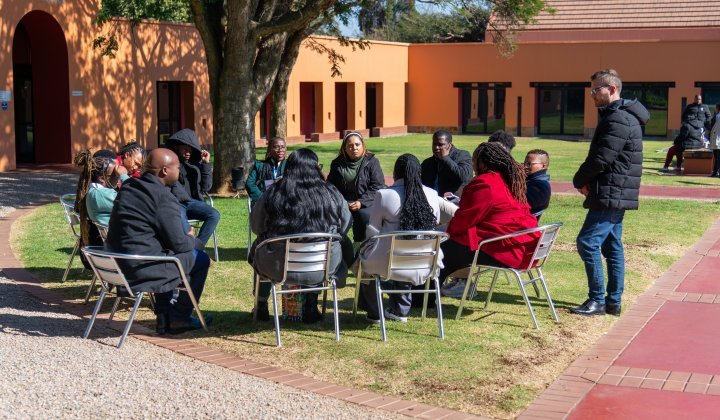Driving through Sandton or Rosebank, you might have seen one of the art installations exhorting passers-by to “Be Kind”. The project has received a positive response from the public, says Rabbi Dovid Masinter, who initiated it. A third installation will soon be unveiled on Constitution Hill.
Masinter’s thinking is deceptively simple. “Bad actions create negative energy, and the converse is also true. It’s common sense,” he says. Crucially, though, those inspired to be kind are offered a way to act via the ARKs (the acronym stands for “acts of random kindness”) supplied by a broader initiative, Change Our World for Good, run by Chabad House, a Jewish non-profit organisation. The yellow plastic ARKs are essentially money boxes for collecting change, to be handed personally to somebody in need – the organisation itself refuses to do this. According to its website, Change the World for Good has distributed over 700,000 ARKs.
Bad actions create negative energy, and the converse is true.
I would argue that something very similar is happening with the #IMSTAYING movement. It was begun by Cape Town-based estate agent, Jarette Petzer, in September 2019 dedicated to “women and men of all races, cultures, religions and creeds who choose to grow and improve South Africa”. While the postings on the Facebook page are varied, a consistent theme is the actions people are taking, or are seeing others take, to assist fellow South Africans. These types of posts celebrate acts of kindness and frequently challenge others to follow suit.
Over Christmas, for example, a Durban follower of the page initiated a challenge to give a 100% tip to a waitron and, says Petzer, it created a chain reaction. Many of the waitrons who benefited were themselves inspired to perform similar acts of kindness. Another example is the initiative to pay off outstanding amounts on school clothes on lay-bye at department stores.
The site has grown phenomenally and now has some 1.1 million followers, with popular posts receiving phenomenal numbers of comments, and thousands of “likes” – 1,000 “likes” is pretty average, and comments can run into the hundreds.
All motherhood and apple pie?
As these numbers show, initiatives like Change the World for Good and #IMSTAYING seem to be tapping into something rather powerful. But what, precisely? And, more importantly, is this tide of goodwill just a feel-good experience for those involved, with no real impact on society more broadly?
Help is at hand: kindness is the focus of a considerable body of academic research, and the University of California in Los Angeles (UCLA) has recently opened an institute dedicated to its study. The UCLA Bedari Kindness Institute was launched in September 2019 thanks to the gift of US$20 million from philanthropists Jennifer and Matthew C. Harris.
The Institute’s mission is to conduct research on kindness, and to provide ways to translate that research into practice. The inaugural director, Professor Daniel Fessler, is an evolutionary anthropologist.
A good starting point is Fessler’s observation that humans are unique in their capacity to cooperate not just with kin or trusted associates, but also with large groups of non-kin and strangers. It’s possible that this behaviour goes right back to our hunter-gatherer past. “Hunting big game is impossible on your own, and it’s unreliable – you need to share the kill to ensure that you get meat when your hunting is unsuccessful,” he says.
Naturally, the more cohesive a group is, the more successful it will be. Creating cohesion between individuals is thus highly beneficial, but this evolutionary adaptation has a downside: increased potential for violent intergroup conflict. As Fessler points out, group unity throughout history has been reinforced by reference to enemies outside the group.
... is this tide of goodwill just a feel-good experience for those involved?
At the same time, group cohesiveness is threatened when members are in conflict with each other, and mechanisms for reconciliation are vital – so vital, in fact, that the action of healing broken bonds can release a flood of positive bonding emotion not only in those involved but also in those witnessing it. It appears all mammals that live in groups possess ways of healing broken relationships in this manner.
This basic dynamic plays itself out across society, creating and maintaining cohesive groups of varying sizes and types, from neighbourhoods and interest groups to companies and nations. Kindness appears to play an important role in promoting the kind of prosocial behaviour that in turn builds cooperative and cohesive societies.
Going up
A paper jointly authored by Adam Sparks, Colin Holbrook and Professor Fessler himself looks specifically at how the emotion of elevation encourages prosocial behaviour. Elevation, in this technical sense, is defined as “the uplifting affect experienced upon witnessing others’ morally praiseworthy actions”.1 The paper explores how elevation, specifically, encourages individuals to invest in prosocial behaviour.
It’s important to understand that elevation drives non-reciprocal prosocial behaviour, creating a sort of prosocial contagion. The paper makes the distinction between the gratitude associated with a reciprocal prosocial act, which is directed at a specific target, and the generalised cooperation inspired by elevation.2 Elevation is thus likely to create a ripple effect, touching many people.
This effect, Fessler argues, is particularly important because it can change the attitude of growing numbers of individuals across society. If one imagines attitude as a continuum from cynicism to idealism, then the idealists will be more likely to act prosocially and to expect others to do so, while the cynics are less likely to act prosocially and to interpret others’ actions as prosocial. The more idealists in a society, therefore, the more prosocial behaviour there is, and the more likely cynics are to shift along the continuum towards idealism.
For example, a city neighbourhood will offer clues as to the prevailing ethos of its inhabitants. Clean pavements and helpful passers-by signal that prosocial behaviour can be expected. Another neighbourhood, offering different cues, would predispose one to be defensive and to interpret others’ actions with suspicion.
What’s important is that our attitude is dependent on context. In one situation, an action will be perceived positively as prosocial, causing elevation; in another, the opposite might be true.
One can see this dynamic playing out on the #IMSTAYING Facebook page, where sometimes an action presented as prosocial is derided for being self-serving or, as might be expected in this country, actually indicative of subliminal racism. An example would be a post of a black housekeeper carrying a household pet on her back, the picture posted by her employer as an example of “going the extra mile”. Some of the comments interpreted the scenario differently. Petzer has made several posts taking up similar issues, and his general position is that one needs to be aware that one interprets others’ actions through the prism of one’s own image of the world (that is, position on the idealism-cynicism axis), and should be less judgemental.
There’s an interesting discussion to be had over how a prosocial act is witnessed. For the purist, the witness must be a third party. But, what if the person performing the act makes it known, say via social media? Both Petzer and Masinter take a pragmatic view, arguing strongly that even so, the outcome is still positive. Petzer views such an action as leadership, and notes that it does inspire others to act, as the examples above show.
Nigel Willis, a retired Judge of the Supreme Court of Appeal, adds another element to the discussion. While studying for his PhD in Theology at Heidelberg University a few years ago, he was forcibly struck by the way in which Germans honour philanthropists – the same point could be made about the United States. By contrast, philanthropy is not much honoured in South Africa. While one can be cynical about philanthropic billionaires, releasing money to be spent on social goods is ultimately positive. One might conclude that the way philanthropy is regarded in a society is to some extent an indication of where it sits on the idealism-cynicism continuum. Thus, while South Africans are individually philanthropic, with 88% participating in charitable activities3, there are relatively few large, high-profile philanthropic foundations.
For example, Patrice Motsepe’s announcement that he would give half his fortune to philanthropy received surprisingly lukewarm media coverage and does not seem to have inspired other local plutocrats to follow suit.
Create a virtuous cycle
Based on the research, it seems clear that the feeling of elevation experienced when witnessing kindness creates a generalised desire to act prosocially, and slowly shift the prevailing attitude of the group towards idealism, becoming more likely to act prosocially and to interpret one’s fellows’ actions as prosocial. The converse is surely also true.
The examples of Change the World for Good and #IMSTAYING seem to bear this out. A particular strength of both seems to be that they offer ways of turning prosocial feelings into deeds. Indeed, it is clear that #IMSTAYING explicitly sees itself as an instrument for social change from the grassroots up. It has a five-point initiative to deliver specific goals that the state cannot or will not do.4 It remains to be seen whether #IMSTAYING can translate itself into a national force, which will mean growing its active base to between five and eight million, Petzer believes.
While changing a whole society might seem daunting, it is likely to be much easier to use this kindness mechanism to transform smaller groups, such as neighbourhoods or small towns. Perhaps this kind of active citizenry could be what it takes to change the national attitude, one person at a time.
1 Adam Maxwell Sparks, Daniel MT Fessler and Colin Holbrook, “Elevation, an emotion for prosocial contagion, is experienced more strongly by those with greater expectations of the cooperativeness of others”, preprint of an article accepted for publication in PLoS ONE.
2 Ibid, p4.
3 Shelagh Gastrow, “Who gives in South Africa and to whom?”, Daily Maverick (5 March 2018), available at https://www.dailymaverick.co.za/opinionista/2018-03-05-who-gives-in-south-africa-and-to-whom/
4 https://web.facebook.com/groups/hashtagimstaying/about/


